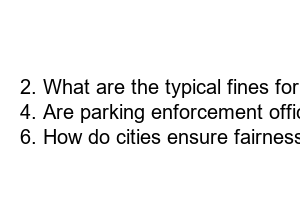불법주정차 단속 기준
Title: Understanding Illegal Parking Enforcement Standards: A Comprehensive Guide
Introduction:
Illegal parking remains a persistent issue in many cities, causing inconvenience to residents and hampering traffic flow. To combat this problem effectively, it is essential to have clear and standardized parking enforcement measures in place. In this blog post, we will delve into the key aspects of illegal parking enforcement, highlighting the importance of adherence to regulations and the steps taken to address violations.
1. Why are parking enforcement standards necessary?
Having well-defined parking enforcement standards plays a crucial role in maintaining order, ensuring public safety, and optimizing the use of available parking spaces, ultimately leading to smoother traffic flow in urban areas.
2. The role of parking enforcement officers:
Trained parking enforcement officers patrol the streets, parking lots, and public spaces to observe and address illegal parking violations promptly. By actively monitoring and enforcing parking regulations, these officers contribute to enhancing public safety and reducing congestion.
3. Common illegal parking violations:
a. Blocking driveways: Illegally parking in front of driveways prevents the property owners from accessing their premises and can lead to traffic congestion.
b. Parking in no-parking zones: Reserved spaces, loading zones, and restricted areas marked as no-parking zones are off-limits for several reasons, such as emergency service access, pedestrian safety, or maintaining traffic flow.
c. Parking in disabled parking bays: Unauthorized use of disabled parking spaces deprives individuals with disabilities of convenient access to public areas, infringing on their rights.
d. Parking in fire lanes: Parking in designated fire lanes obstructs emergency vehicles and poses a significant threat during urgent situations.
4. Consequences of illegal parking:
Violators of parking regulations may face penalties, including fines, towing, or impounding of the offending vehicles. These measures act as deterrents to discourage illegal parking and promote compliance with parking regulations.
5. Utilization of technology in parking enforcement:
With the advancement of technology, several cities have implemented smart systems to streamline parking enforcement efforts. This includes the use of automated license plate recognition (ALPR) cameras, parking sensors, and mobile applications, making enforcement more efficient and accurate.
6. Community involvement in parking enforcement:
Creating an awareness campaign and garnering community support in reporting illegal parking can strengthen enforcement efforts. Encouraging citizens to be proactive in reporting violations helps maintain a shared responsibility for ensuring parking regulations are followed.
7. Are parking enforcement measures the same in every city?
While there are shared principles and best practices for parking enforcement, it is essential to consider that each city may have specific regulations tailored to its unique requirements, traffic patterns, and infrastructure.
In summary, illegal parking enforcement standards play a pivotal role in maintaining order, ensuring public safety, and improving traffic flow. By adhering to these standards, utilizing technology, and fostering community engagement, cities can effectively address illegal parking issues and create a harmonious parking environment for all.
FAQs:
1. How can I report an illegal parking violation?
2. What are the typical fines for illegal parking?
3. How can I request a disabled parking bay in my area?
4. Are parking enforcement officers authorized to issue tickets?
5. Can parked vehicles obstructing traffic face immediate towing?
6. How do cities ensure fairness in parking enforcement?

